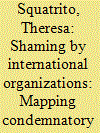|
|
|
Sort Order |
|
|
|
Items / Page
|
|
|
|
|
|
|
| Srl | Item |
| 1 |
ID:
173389


|
|
|
|
|
| Summary/Abstract |
This study provides an empirical analysis of 79 official ISIS English-language videos and uses Quentin Skinner’s analytical approach to examine the prevalence of and changes in the speech acts used in the videos. The results show that directive, expressive, and assertive were the most common classes of speech acts and that threatening speech acts were featured most prominently. This study concludes that the fundamental semantic intention of the videos is to mobilise the addressees to align with the group’s demands and the video might serve more than simply recruitment, but as a diplomatic/negotiating tool for real-world events that ISIS faces.
|
|
|
|
|
|
|
|
|
|
|
|
|
|
|
|
| 2 |
ID:
167400


|
|
|
|
|
| Summary/Abstract |
In the face of escalating conflicts or atrocities, international organizations (IOs), alongside non-governmental organizations (NGOs), often vocalize public condemnation. Researchers have examined NGO shaming, but no extant literature has comparatively explored if, how and why IOs shame. This article fills this gap. We conceptualize IO shaming as condemnatory speech acts and distinguish between the agent, targets and actions of shaming. We theorize how compliance and socialization are motives that lead IOs to shame. Empirically, we use new data on more than 3000 instances of IO shaming, covering 27 organizations between 1980 and 2015 to examine empirical patterns across the three dimensions of agents, targets and actions. We find that the majority of IOs do employ shaming but to varying degrees. Global, general-purpose IOs shame the most and regional, task-specific IOs the least. IOs mainly shame states, but there is a rise in the targeting of non-state and unnamed actors. While many condemned acts relate to human rights and security issues, IOs shame actions across the policy spectrum. These findings indicate that IO shaming is driven by compliance and socialization motives and that it is a wider phenomenon than previously recognized, suggesting possible avenues for further inquiry.
|
|
|
|
|
|
|
|
|
|
|
|
|
|
|
|
| 3 |
ID:
188316


|
|
|
|
|
| Summary/Abstract |
This article will explore the differing attitudes among British parliamentarians towards the use of German soldiers in 1756 and 1776. Utilising speech act theory, it will be shown that German soldiers were constructed as mercenaries in 1776 because they were being employed to fight against British subjects – the North American colonists. However, when nearly identical German soldiers were employed to fight against a French adversary in 1756, they were not constructed as mercenaries. It will be concluded that the mercenary as a figure of war is not a static, transhistorical concept with universal characteristics. Rather, the mercenary is socially constructed, and, as such, is only made possible in specific historical and socio-political contexts.
|
|
|
|
|
|
|
|
|
|
|
|
|
|
|
|
| 4 |
ID:
112365


|
|
|
|
|
| Publication |
2012.
|
| Summary/Abstract |
This essay explores letter writing in late ancien régime France as a means of political contestation. Drawing from Rancière's notion of "illegitimate speakers," I retrace the story of an obscure Bastille prisoner, Geneviève Gravelle, whose letters to the king and the French public reveal the simultaneously political, literary, and aesthetic barriers impeding such illegitimate speech and the strategies used in attempting to overcome them. Attending to the historical-poetic context in which Gravelle's letters were composed and circulated, I elaborate, first, a politics of voice that highlights the uncertain and multiply mediated processes on which political speech depends, and second, a politics of reading and writing in which sovereignty is both challenged and impersonated through the epistolary form.
|
|
|
|
|
|
|
|
|
|
|
|
|
|
|
|
|
|
|
|
|